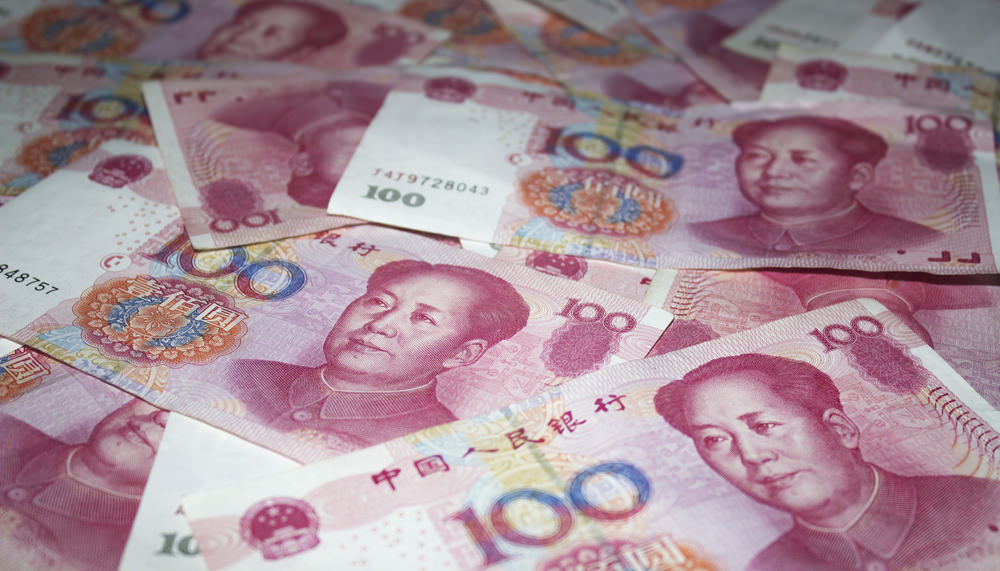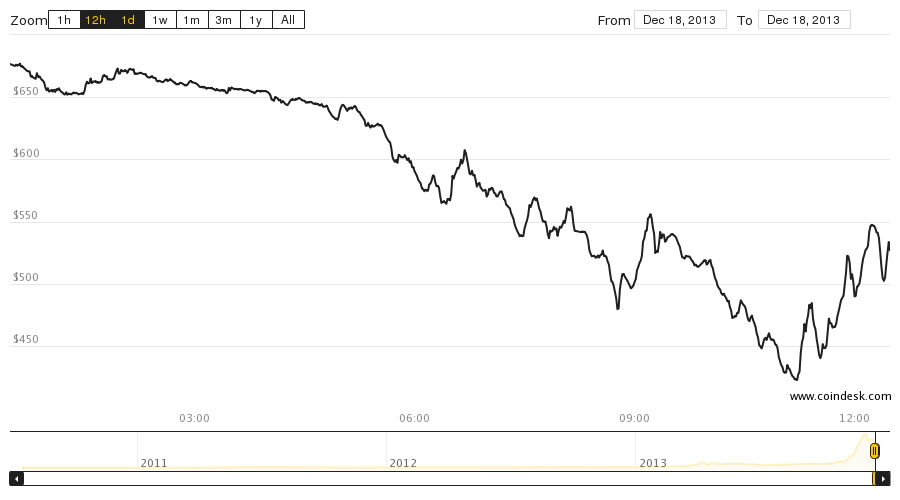
Bitcoin Price Falls Further as BTC China Exchange Shuts Off Fiat Deposits
UPDATED on 18th December at 17:10 (GMT)
BTC China told CoinDesk it is expecting to reinstate deposits in RMB soon. Bobby Lee said he is now working with another third party payment company to try and reinstate RMB pricing, and is hoping to make an announcement on the Weibo account in the next few hours.
This will now be the firm’s third payment provider relationship inside a week. Lee brushed off worries that the new relationship could also be placed in jeopardy by PBOC’s most recent move.
“If this keeps happening, ten times later, will I keep going? I don’t know. I can’t predict the future. But for now we’re going to try one more time, to see,” he said.
------------------------------------
The price of bitcoin plummeted still further this morning, after news emerged that at least one exchange in China had blocked deposits made in RMB (Chinese yuan), the national fiat currency.
China’s and indeed the world's largest bitcoin exchange, BTC China, announced that it would disallow those deposits in a post on its verified Weibo account.
Bobby Lee, CEO of BTC China, said: "This morning, we got notice from our third-party payment provider YeePay that it would cut off deposits for us at 12 noon and sure enough, we got cut off today."
YeePay had given the company two hours’ notice, he said. The exchange had only just signed a deal with the third party payment provider on Monday, following an abrupt termination of its agreement with third party payment firm TenPay on Sunday.
"We all know the reason – it's as plain as daylight – they cut us off because of what happened at the meeting on Monday," he added.

The bitcoin price dropped and then rallied this morning on the latest news from China.
Lee was referring to the meeting between the People’s Bank of China (PBOC) and third-party payment companies, in which the payment firms were told to stop dealing with bitcoin exchanges.
No official statement has been issued by PBOC or any of the third-party payment processors about this, and Lee thinks it is possible that this will remain the case. "If they wanted to issue something official, they would have done already."
Earlier this month, banks had also been told not to deal with exchanges, removing the ability for customers to use web-based payment systems directly integrated with the exchanges via APIs.
[post-quote]
"Right now we, as a bitcoin exchange, have suspended taking all deposits in RMB. But, on the withdrawal side, people still have the ability to withdraw RMB. There should be no worries – all the money is safe, secure and is all accounted for," said Lee.
Customers are also still able to deposit and withdraw bitcoins from BTC China.
The news had a severe effect on bitcoin pricing over a few hours, forcing it down to levels not seen in a month. At the time of writing, the price was bouncing back from a low of $488, down from a high of $990 last week, putting it at its lowest point in the past few weeks.
Jack Wang, a bitcoin entrepreneur about to start a virtual currency company in Beijing, said that this would force the market to find alternative ways to develop.
“Without exchanges, the market will have to find different business models that use bitcoin, which the government has acknowledged to be legal and property."
We asked Bobby Lee what's next for BTC China. "At this point, it's too early to speculate. We're taking each day at a time. We are a startup, we are nimble and flexible and we will adjust to the marketplace," he said.
Editor's note:
Previously, this article stated that, up until today, customers wanting to deposit RMB into their bitcoin exchange accounts were able to do so in two ways: via an Internet transaction, and as a direct deposit over the counter. CoinDesk said that after Dec 5, the first option had been removed, while the second was still valid until today.
CoinDesk has since spoken to Bobby Lee again, who clarified that all payments from banks require third party processor involvement, and that Internet payments from banks had been possible until his relationship with TenPay and subsequently YeePay were severed. Without these relationships, it was unable to process RMB payments into its customers’ accounts.
“That’s where the problem showed up. If we’re not allowed to deal with third party payment companies then they can’t take deposits for us on behalf of customers, and then we have this catch-22 where we can no longer operate our bitcoin exchange as before,” Lee said.
Co-authored by Danny Bradbury and Emily Spaven.
Chinese yuan image via Shutterstock
DISCLOSURE
The leader in news and information on cryptocurrency, digital assets and the future of money, CoinDesk is a media outlet that strives for the highest journalistic standards and abides by a strict set of editorial policies. CoinDesk is an independent operating subsidiary of Digital Currency Group, which invests in cryptocurrencies and blockchain startups. As part of their compensation, certain CoinDesk employees, including editorial employees, may receive exposure to DCG equity in the form of stock appreciation rights, which vest over a multi-year period. CoinDesk journalists are not allowed to purchase stock outright in DCG.

